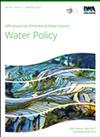Research on the optimization of cooperative advertising strategy in the promotion of water-saving products based on differential game
IF 1.8
4区 环境科学与生态学
Q4 WATER RESOURCES
引用次数: 1
Abstract
The promotion of water-saving products is one of the vital ways to implement water conservation action, and advertising is a significant way to promote water-saving products. Taking the two-level Supply Chain consisting of a leading manufacturer and a retailer as an example and considering the advertising cost-sharing ratio of the two, as well as the government's R&D subsidies to manufacturers and product subsidies to consumers, this study establishes differential game models in three cases, that is, non-cooperative contract without cost sharing, cooperative contract with cost sharing, and collaborative cooperation contract. Also, numerical simulation is adopted to analyze the sensitivity of important parameters. The results show that the product goodwill and market demand for water-saving products can achieve Pareto optimality under the collaborative cooperation contract. In addition, the cooperative contract with cost sharing can realize Pareto improvement of the optimal benefit of the Supply Chain under certain conditions. Moreover, in the absence of the government's R&D subsidies, the overall benefits can achieve Pareto optimality under the collaborative cooperation contract. This study provides theoretical guidance and reference for the advertising cooperation strategy for the main bodies in the Supply Chain.基于差分博弈的节水产品推广合作广告策略优化研究
节水产品的推广是实施节水行动的重要途径之一,而广告则是节水产品推广的重要途径。本文以由领先制造商和零售商组成的两级供应链为例,考虑两者的广告成本分担比例,以及政府对制造商的研发补贴和对消费者的产品补贴,建立了三种情况下的差异博弈模型,即无成本分担的非合作合同、有成本分担的合作合同和协同合作合同。并采用数值模拟的方法对重要参数的灵敏度进行了分析。结果表明,在协同合作契约下,节水产品的产品商誉和市场需求能够达到帕累托最优。此外,成本分担的合作契约在一定条件下可以实现供应链最优效益的帕累托改进。此外,在没有政府研发补贴的情况下,协同合作契约下的整体效益可以达到帕累托最优。本研究为供应链主体的广告合作策略提供了理论指导和参考。
本文章由计算机程序翻译,如有差异,请以英文原文为准。
求助全文
约1分钟内获得全文
求助全文
来源期刊

Water Policy
环境科学-水资源
CiteScore
3.10
自引率
12.50%
发文量
81
审稿时长
6-12 weeks
期刊介绍:
Water Policy will publish reviews, research papers and progress reports in, among others, the following areas: financial, diplomatic, organizational, legal, administrative and research; organized by country, region or river basin. Water Policy also publishes reviews of books and grey literature.
 求助内容:
求助内容: 应助结果提醒方式:
应助结果提醒方式:


